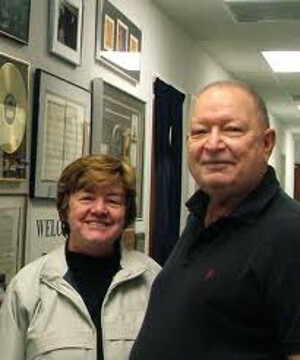It’s hard for me to imagine Jazz a la Mode without Arbors Records. Arbors may not be as historically significant as Commodore or Blue Note, Verve or Prestige, but for the last 20 years it’s been a godsend for lovers of classic and mainstream jazz. Alas, the label’s founder, Mat Domber, died on September 19 at the age of 84, and I’ll pay memorial tribute in tonight’s Jazz a la Mode. Tune in at 8 for Scott Hamilton, Ehud Asherie, Carol Sloane, Ken Peplowski, the late Ruby Braff, and many more.

Domber was a New York real estate lawyer who got started making records when he discovered that one of his personal favorites, the Trad Jazz clarinet player Rick Fay, who was then 63, had never made a record as a leader. Making up for lost time, Domber released 13 sessions on Fay over the next decade, and along the way he recruited Ruby Braff, Bob Haggart, Ralph Sutton and dozens of other mainstreamers with whom he built a catalogue of over 300 uniformly excellent recordings. Domber used his personal resources to keep things afloat, but to whatever extent the bottom line grew profitable, the operation was at heart a labor of love. He also endowed scholarships in memory of Flip Phillips and Ruby Braff at the University of Miami.
In a week in which the proposed mega-merger of EMI-Universal is raising alarm bells and “threatening the future of music,” Mat and his wife Rachel were exemplars of the kind of proprietorship that’s been at the heart of the jazz record business for decades. Thanks to the Dombers, and such contemporary stewards as Joe Fields at High Note; Spike Wilner at Smalls Live; Marc Edelman at Sharp Nine; Gerry Teekens at Criss Cross; Richard McConnell at Max Jazz; Tom Burns at Capri; Nils Winther at Steeplechase; and in-house mavens Nick Phillips at Concord; Al Pryor at Mack Avenue; Don Was at Blue Note, and others too numerous to mention, the music may not be topping the charts but it’s sustaining operations that continue to churn out jazz releases in profuse numbers.
Domber operated Arbors out of Clearwater, Florida, where he presided over an enterprise that borrowed pages from the books of such impresarios as Norman Granz, Dick Gibson, and George Wein. He hosted annual jazz parties and concerts, Caribbean jazz cruises, and in 2003 incorporated a touring package, The Statesmen of Jazz, whose ranks included Clark Terry, Joe Wilder, Houston Person, Bucky Pizzarelli, and the late Carrie Smith. Several outfits got their start at Arbors parties, among them Johnny Varro’s Swing Seven, John Sheridan’s Dream Band, Dan Barrett’s Jazz Bears, and various combinations fronted by Bob Wilber. Like the cast of a great repertory theater, dozens of musicians played interchangeable roles in the shifting array of ensembles, all united around the common motives of great songs, inventive solos, and driving swing.
In 2008, Domber was profiled in The Mississippi Rag, and offered a highly qualified list of his Arbors favorites. I was pleased to see Ruby Braff, whom Mat calls “the finest cornetist of his time,” at the very top of the list, and among the five titles he selected by Ruby were the two volumes that Arbors released from Braff’s 1993 performance at the Regattabar in Cambridge, Controlled Nonchalance. I was in the house for two of the sets played by Braff and His Buddies, a group of fellow New Englanders including Dave McKenna, Scott Hamilton, Gray Sargent, Marshall Wood and Chuck Riggs, and the music still holds as much freshness and delight as when I first heard it in the making. Ruby called this “conversational music,” an apt phrase to describe not only the moderate dynamics of the music, but the ease with which these players engage in creative dialogues on what the late Bostonian called “nice tunes.” If you ever needed evidence of the inexhaustible possibilities for improvisation on the great standards, here it is.
And here’s footage of two more of Domber’s favorites, Becky Kilgore and Harry Allen, at an Arbors jazz party performing “The Best Things in Life Are Free.”